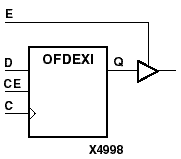Libraries GuideChapter 8: Design Elements (OAND2 to OXOR2)
OFDEXI
D Flip-Flop with Active-High Enable Output Buffer and Clock Enable (Asynchronous Preset)
XC3000
| XC4000E
| XC4000X
| XC5200
| XC9000
| Spartan
| SpartanXL
| Spartan2
| Virtex
|
|---|
N/A
| Macro
| Macro
| N/A
| N/A
| Macro
| Macro
| N/A
| N/A
|

OFDEXI is a D flip-flop whose output is enabled by a tristate buffer. The data output (Q) of the flip-flop is connected to the input of an output buffer or OBUFE. The output of the OBUFE (O) is connected to an OPAD or an IOPAD. These flip-flops and buffers are contained in input/output blocks (IOB). The data on the data input (D) is loaded into the flip-flop during the Low-to-High clock (C) transition. When the active-High enable input (E) is High, the data on the flip-flop output (Q) appears on the O output. When E is Low, the output is high impedance (Z state or Off). When CE is Low and E is High, the output does not change.
The flip-flop is asynchronously preset, output High, when power is applied. FPGAs simulate power-on when global set/reset (GSR) is active. GSR defaults to active-High but can be inverted by adding an inverter in front of the GSR input of the STARTUP symbol.
Inputs
| Outputs
|
|---|
CE
| E
| D
| C
| O
|
|---|
X
| 0
| X
| X
| Z
|
1
| 1
| 1
| 
| 1
|
1
| 1
| 0
| 
| 0
|
0
| 1
| X
| X
| No Chg
|
